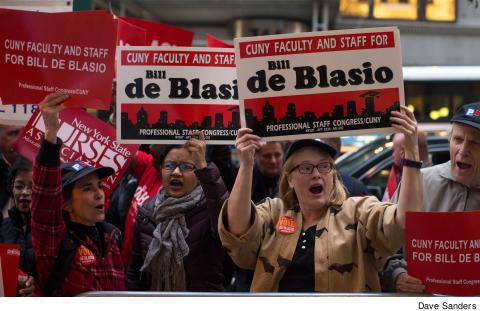 |
The 2017 mayoral election in New York was both more and less significant than organized labor might have imagined. More, because it demonstrated staying power for a progressive agenda in New York City after four decades in which urban neoliberalism held sway under the long shadow of the 1970s fiscal crisis. If all goes well the election could even signal a return to the pragmatic liberalism of the 20th century, when city elites accepted the idea that a share of the city’s vast wealth should support public services – from mass transit and public hospitals to public housing and free higher education – for poor and working-class New Yorkers. After all, the hard-fought $300 million that Mayor Bill de Blasio, endorsed by many unions including the PSC, secured for universal pre-kindergarten in his first term represented a mere percent of the annual Wall Street bonuses paid out in 2014.
EXPAND PROGRESSIVE AGENDA
But de Blasio 2.0 may not be everything his supporters hoped for, as he lost a number of battles in his first term when it came to pragmatic dealmaking, particularly as that game is so skillfully played by Governor Andrew Cuomo. With Cuomo eyeing a 2020 presidential bid, the mayor’s agenda will be even more vulnerable to the governor’s political calculations. This fraught political landscape has been complicated further by the overwhelming subway crisis that has consumed media attention, commanded an infusion of public dollars and exacerbated tensions between the mayor and the governor.
In his reelection campaign, the mayor opted for a cautious approach that highlighted his first-term accomplishments, most notably establishing the universal pre-kindergarten program, dismantling heavy-handed policing in communities of color (while maintaining historically low levels of crime) and resisting the Trump administration’s anti-immigrant policies. His accomplishments are real and significant, even if some – like building and preserving tens of thousands of units of affordable housing and combating homelessness – pale against the magnitude of the problems that the city faces. Simply maintaining this agenda for another four years will have a positive impact on people’s lives. And the mayor has proposed extending universal pre-kindergarten to all three-year-olds in the city. This “3-K for All” initiative would, like pre-kindergarten, be especially valuable not only due to the benefits of early childhood education, but the program provides thousands of jobs and does double duty as free child care for tens of thousands of children – a substantial subsidy for many in and outside the municipal workforce.
The mayor should aim higher. He played safe during the campaign, and now it is time to build on his agenda in order to reinvigorate the progressive movement in New York City. There are more potential victories for progressives in New York, even in the context of a term-limited mayor and an ambitious governor.
HIGHER ED FUNDING
One ripe area of particular relevance to the PSC is higher education. Programs that expand access to higher education enjoy broad public support because they are both beneficial to lower-income residents and politically salient to the middle class; indeed, Governor Cuomo has already shown that he grasps the political math with his tuition-free degree program, the Excelsior Scholarship, for New York residents earning less than $150,000 annually attending CUNY and SUNY colleges. It’s not hard to imagine that the governor could be convinced of the payoff from investing in CUNY and SUNY institutions directly, much as California Governor Jerry Brown scored points in his successful fight for a major reinvestment in that state’s underfunded education systems. By pushing this issue onto the agenda and sweetening the deal with some city money, Mayor de Blasio could share in this victory. In order to succeed on this and other progressive goals the mayor will need to call up, not call out, the governor to negotiate win-win policies.
Alexander Reichl is a professor of political science at Queens College.

